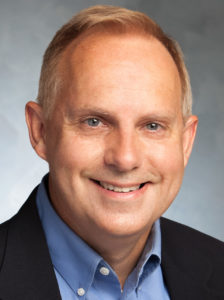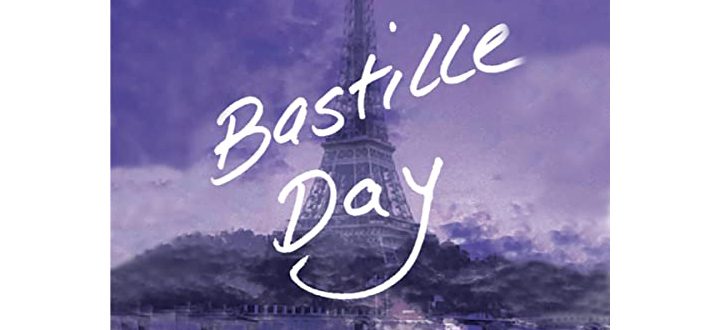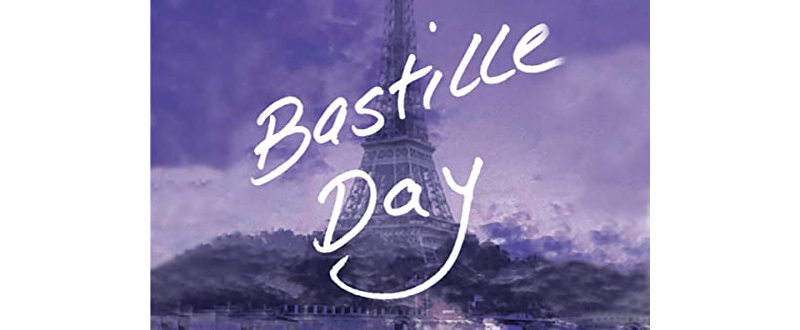On April 4, my novel Bastille Day was released from Raven Fiction, a new literary imprint of Paraclete Press. It debuted on Amazon as their best-selling new work of contemporary Christian fiction, and I have many and complicated feels about that.
It is an honor and a privilege when anyone loves and supports your work. But being named a “Christian novelist” has ever been problematic for me. As I posted on social media, I have spent my whole writing life feeling torn between the literary and faith worlds, seemingly never enough of one thing for the other:

Greg Garrett
There are secular readers who can’t understand how a Pulitzer Prize-winning author like Robert Olen Butler could call me a remarkable novelist if my big thematic concerns include doubt and faith.
And there are religious readers who can’t understand how my book could be “Christian” if it includes violence, sexuality or “bad words.”
Thankfully, I have found useful literary models — James Baldwin, Walker Percy, Flannery O’Connor, Marilynne Robinson — for whom questions of faith, justice, hope, grace and redemption were not marginal but central to their works and their lives, just as they have been central to mine.
It feels less odd to follow in their giant footprints — as this book most assuredly does.
I’m so pleased to share an exclusive excerpt from Bastille Day with you. It comes from early in the book, where Calvin Jones, a TV journalist recently arrived in Paris, is clearly wrestling with his past — his relationship with an abusive father, killed in Iraq, the death of a dear friend and colleague, also killed in Iraq, his own 10-year struggle to remain sober and alive after all that.
It is most definitely a Good Friday passage. But please be assured that Sunday is coming.
I hope you might find something true and beautiful here.
It is Christian fiction.
Paris — July 12, 2016, Tuesday
The old dreams were back.
I hadn’t had them for a long time — for years, actually. But since the Black Lives Matter shootings, and now in Paris, my windows open to the sounds of far-off traffic, sweat soaking the bed, I was back in country.
I was back watching people die.
The night was dark, and all I could see were moving shadows.
And all I could hear was the sound of things exploding.
Boom.
Boom.
BOOM.
The explosions got closer and closer. I told Khalid, my driver, and Waseed, my cameraman, to get down. And in my dream, as they always did in real life, they laughed at me.
“Don’t be so scared, Calvin Coolidge,” Khalid said. He really did say this to me. All the time. He was so proud that he had studied American history. He knew that our President Coolidge was also called “Silent Cal,” and sometimes he called me that instead. It was not entirely inappropriate.
Khalid saved my life a hundred times. Seriously.
Khalid saved my life a hundred times. Seriously. He pulled me out of riots. He drove us out of jams where men with their faces covered by kafiyas were chasing us, or actually shooting at us. He persuaded people who thought they wanted to kill me to let me go, for his sake, for the sake of the Prophet. He told a sheikh who wanted to kidnap me and sell me to some bad guys that, first, he did not want to split the profits with him, that this would be dishonorable. And second, that his, Khalid’s clan, was bigger, smarter and tougher than the sheikh’s, and that it would go badly for them if the sheikh made a stupid move now.
“What is he saying?” I asked. They had talked for 10 minutes in low voices, and I had only picked up a few words yet that early in my tour. Later, Khalid told me everything, but he knew now I needed to keep my eye on the ball. He smiled and nodded and said, “He says he will talk to you about the insurgents.”
When I complained about the shifting sides, about the dishonesty of so many of the Iraqis we met, Khalid pulled together a pile of videotapes from somewhere and asked me to watch them.
They were torture and interrogation tapes from the Baathist prisons, Iraqis who had suffered and died under the gentle ministrations of the Husseins and their flunkies. I had to stop watching. It was as bad as the insurgent beheadings, and I got Khalid’s point.
Don’t judge us if you haven’t walked in our sandals.
If you or those you love haven’t been tortured in Saddam’s prisons.
Those people were seriously damaged, that whole country was seriously damaged, and I got it, and I forgave a lot, as much as I could, because I know what it’s like to be seriously damaged.
I even got Quisas, the Arabic concept of revenge as justice. “A life for a life,” they would say, and I came to want that myself.
But, in all things, through all the terrible events I reported, I trusted Khalid, and he trusted me.
In all things, through all the terrible events I reported, I trusted Khalid, and he trusted me.
He was more than my driver.
He was my friend, and I loved him, and I could not live with myself after what happened to him.
In the dream, the explosions come closer, always closer, like the footprints of a giant, pounding his way toward us step by step. The earth shakes. My ears hurt.
And in the dreams, as always, Khalid steps away from me smiling and then disappears in a flash of violent light.
I woke up, panting, still sweating, one of those crazy ooga-ooga French police sirens sounding in the distance. It might have been my head going off. I’d had way too much to drink the night before and still couldn’t seem to sleep. Not a good sign, the drinking or the insomnia.
My phone was ringing. That’s what had woken me up, and now my head swiveled and I found it on the bedside table.
My ringtone was The Clash: “Rock the Casbah, rock the Casbah.”
If you can’t name it, it has power over you, right? Don’t say “He Who Must Not Be Named.”
Call him “Voldemort.”
I picked up the phone to check the call. Rob, I figured. Like him to do an early callout. But the phone said different: “Uncle Jack.”
This was not going to go well for me. But I answered all the same.
This was not going to go well for me. But I answered all the same. Jack was my only living relative.
“What time is it there?” I asked, trying to convey a lightness I did not feel.
“When were you going to tell me?” he asked, a counter question, and clearly he was pissed. “I had to talk to that girl of yours to find out where you went.” That must have been quite a phone call.
“I told you I was thinking about taking the job,” I said. Which was true. I had told him I had an offer. And then he had told me he thought going to Paris was a stupid idea, and that was where we had left it, and then I covered the BLM shooting. I only remembered telling Kelly McNair because she had immediately told me she would come over and visit me.
“What time is it?” I asked.
“Ten,” he said. “I just went off shift.”
“Anything happen tonight?” Easiest way to derail him was to get him talking about the job.
“A couple of traffic stops,” he said. “Broke up a fight between some homeless guys. Got called to a domestic.”
“Anything that would make the news?”
“Nada.” He went silent long enough that I actually pulled the phone from my ear and checked to see if we were still connected.
“Are you OK?” he finally asked. “I know last week must have been — ”
“I’m OK,” I said.
“Really?”
Uncle Jack was my only living relative. He was my dad’s younger brother, and a Dallas policeman, and he was actually the one who found me wandering downtown after my live report at the Black Lives Matter shooting, my microphone in my hands. It — and they — were covered with blood.
He was actually the one who found me wandering downtown after my live report at the Black Lives Matter shooting.
He found me, and he bundled me into his squad car, and he drove me home.
The truth. Well.
“No sir,” I said, shaking my head. “No. I am not OK.”
His answer was immediate. “Do you need me to come over there? ’Cos I will, nephew.”
I actually laughed at that. Jack Jones, in his white Resistol hat and cowboy boots, striding through the City of Light.
“Rob is here,” I said. “That’s a good thing.”
“But —”
“No buts, Uncle Jack. I’m in a bad place now. It happens, as you well know. How are you holding up?” The Dallas Police Department must be reeling. Losing a single officer was a tragedy. Five was uncharted waters, the edge of the world.
“Sweet Baby Jesus, Cal,” he said. “These funerals. They are breakin’ my heart.”
“I know,” I said. I had covered plenty. The police sirens were closer now, and the sounds of traffic through my window were growing louder as Paris began to grow light. “I am so sorry.” We sat in silence. I hadn’t talked about this, but maybe it was time to say it out loud. “Officer Reynolds saved my life. I mean —”
“I know,” he said. He let out a sigh. “He did his job.”
“You go to that funeral?”
“Yup. Wife. Three children. I thanked her for your life. It seemed to mean something.”
“Thank you, Jack,” I said. “I hope I deserve it.” I rolled out of my bed, walked over to the sink, drew a cold glass of water. I was silent long enough that he asked: “Cal?”
“I’m having the dreams again,” I told him. I drank to the bottom of the glass, and still I was parched.
“Ugh,” he said. “Well, I’d be surprised if you didn’t.” He sighed again. “You know, maybe you should consider another line of work.”
“I was thinking about being a checker in Walmart,” I said. “But that comes with its own distinct set of challenges.”
“Oh my Lord,” he said. “Enormous women in yoga pants.”
“Jack,” I said. I filled my glass again.
“That simply should not be allowed.”
“Go home,” I said. “Hug that wife of yours for me.”
“I worry about you,” he said.
I nodded. “Well. You probably should.”
“The dreams?”
“Khalid,” I said. There was a long pause.
“Son,” he said at last, “you need to let that go.”
I drank, put my glass in the sink. “I know I do,” I said. “Yet here I sit.”
Greg Garrett teaches creative writing, film, literature and theology classes at Baylor University. He is the author of two dozen books of fiction, nonfiction, memoir and translation, including the critically acclaimed novels Free Bird, Cycling, Shame and The Prodigal. He is one of America’s leading voices on religion and culture. One of his most recent nonfiction books is In Conversation: Rowan Williams and Greg Garrett. His latest book, A Long, Long Way: Hollywood’s Unfinished Journey from Racism to Reconciliation, is hot off the presses. He is a seminary-trained lay preacher in the Episcopal Church. He lives in Austin with his wife, Jeanie, and their two daughters.
Related articles:
Greg Garrett, Baylor prof and BNG columnist, awarded Baugh grant for research on race and media
Stranger in the Village: James Baldwin and inclusion | Opinion by Greg Garrett


